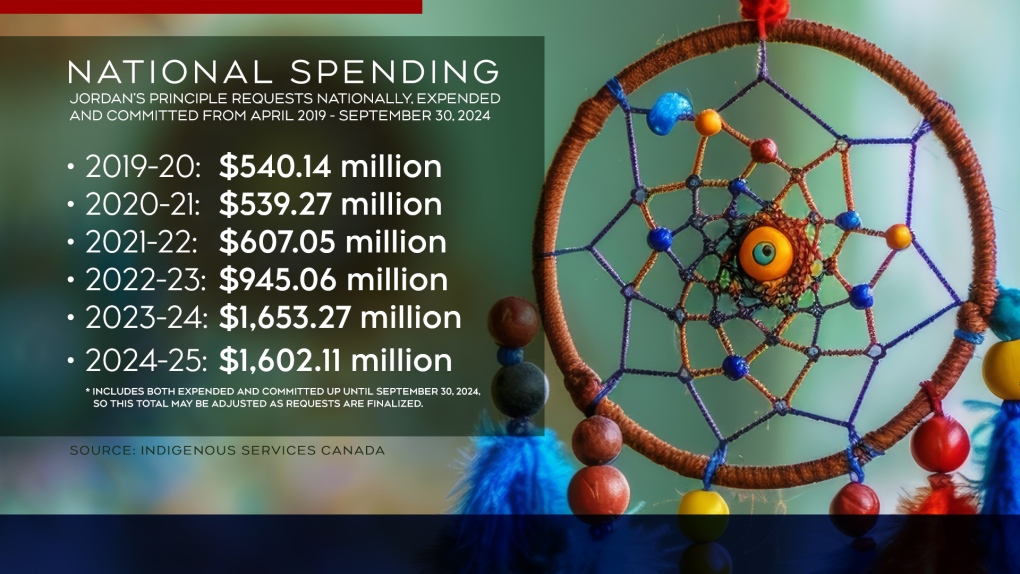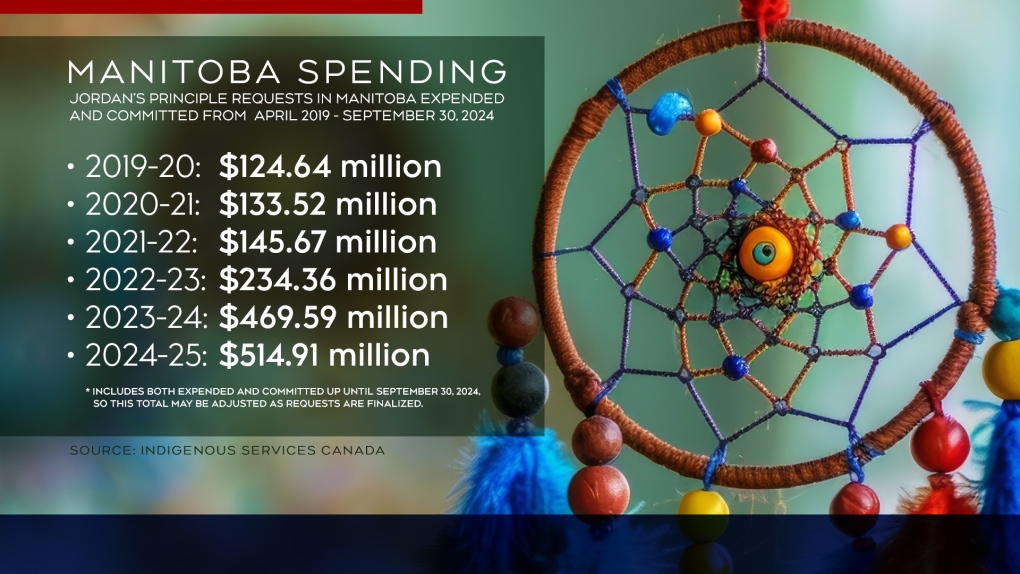$6.44 billion was spent on Jordan’s Principle requests nationally
In the last five years, the number of approved Jordan’s Principle requests and the subsequent spending have nearly tripled.
The data on the legal ruling that requires governments to support essential services for First Nations children’s well-being was shared with CTV News Winnipeg by Indigenous Services Canada (ISC). It shows there has also been a sharp spending increase so far this fiscal year.
- The information you need to know, sent directly to you: Download the CTV News App
- Sign up now for daily CTV News Winnipeg newsletters
Since its inception in 2016, the ISC numbers show $6.44 billion was spent on Jordan’s Principle requests nationally.
Nationally, more than $1.6 billion has been spent on approved and committed Jordan’s Principle requests between April 1 and Sept. 30 this fiscal year. In the 2019-20 fiscal year, the total Jordan’s Principle spending in Canada was $540 million.
Nearly one-third of the current year’s spending has gone to applicants from Manitoba, an approved $515 million.
On Thursday, ISC said there are 478 full-time equivalent staff working with Jordan’s Principle and Inuit Child First Initiative as of November. In Manitoba, there at 62, roughly 13 per cent of the total workforce.
Jordan’s Principle is a legal ruling named after Jordan River Anderson, a young boy from the Norway House Cree Nation in Manitoba. It ensures First Nations children have access to support they need and can include health, social, educational, mental health, dental, and medical equipment. A tribunal reviews individual and group requests and must review them within an expedited timeframe.
In the nearly eight years Jordan’s Principle has been in effect, there have also been more than 7.8 million requests for funding.
 Jordan's Principle National Spending (CTV News Winnipeg)
Jordan's Principle National Spending (CTV News Winnipeg)
Jordan’s Principle in Crisis: AFN
On Thursday, Assembly of First Nations National Chief Cindy Woodhouse, along with other First Nations leaders from Manitoba, will be voicing their concerns about Jordan’s Principle funding.
The group included Acting Assembly of Manitoba Chiefs Grand Chief Betsy Kennedy, Manitoba Keewatinowi Okimakanak Grand Chief Garrison Settee, and AFN Manitoba Regional Chief Willie Moore.
“No child should face delay, denial, or gaps in services to administrative red tape. A long-term reform agreement is an urgent priority to make sure First Nations children receive the care and services they need and deserve,” said Moore.
The group highlighted challenges First Nations face when trying to access those essential services for children and the need for sustainable funding to uphold Jordan’s Principle.
“The federal governments failure to address growing Jordan’s Principle backlog adds financial strain on First Nations leadership forcing them into difficult position to provide essential services despite limited resources," said Kennedy.
 Jordan's Principle Manitoba Spending (CTV News Winnipeg)
Jordan's Principle Manitoba Spending (CTV News Winnipeg)
Federal response to expenditures
In an email statement from Nov. 28, an Indigenous Services Canada spokesperson said each request is reviewed on a case-by-case basis.
“Each situation is unique and therefore funding can vary greatly from region to region or year to year, depending on the individual needs of First Nations children that may arise at any time, and the associated cost of funding the different products or services that are approved,” the spokesperson wrote.
When asked if there were any places at risk of running out of its budgeted funds, the spokesperson said requests continue to be funded for Indigenous Services Canada regional offices.
-With files from CTV's Alex Karpa and Michelle Gerwing.
CTVNews.ca Top Stories

PM Trudeau says he thinks Trump is using talk of Canada becoming 51st state to distract from tariff impact
Prime Minister Justin Trudeau says he thinks U.S. president-elect Donald Trump is drumming up drama on Canadian statehood to detract from tariff talks.
LIVE UPDATES Here's the latest on the most destructive fire in L.A. County history
A series of wildfires are tearing through densely populated parts of the Los Angeles, Calif. area. Five people have been reported dead. U.S. Gov. Gavin Newsom says thousands of resources have been deployed to contain the fires.
More than 150 students sick at University of Guelph, says public health
More than 150 cases of gastroenteritis have been reported at the University of Guelph.
Multiple Chinese warships track Canadian HMCS Ottawa through the South China Sea
The silhouettes of a hulking Chinese Navy destroyer dubbed 'Changsha' and a warship called the 'Yuncheng' can been seen hovering along the horizon, mirroring HMCS Ottawa’s movements.
Canadian travellers now require an ETA to enter U.K. Here's what to know
Starting Jan. 8, Canadians visiting the U.K. for short trips will need to secure an Electronic Travel Authorization (ETA) before boarding their flight, according to regulations set out by the U.K. government.
'True when I said it, true today': former Canadian PM Harper pushes back against Trump on social media
Former prime minister Stephen Harper doesn’t find U.S. president-elect Donald Trump’s jibes about Canada becoming the 51st U.S. state very amusing.
Toronto police investigating parental abduction, three-year-old boy believed to be in India
A parental abduction investigation is underway after a father allegedly failed to return to Canada with his three-year-old son after a trip to India, Toronto police say.
California's insurance is in crisis. The solution will cost homeowners a ton
Lynne Levin-Guzman stood in the front yard of her 90-year-old parents’ home in Los Angeles County, California, trying to protect it with a garden hose — because their insurance company no longer would.
As wildfires rage in Los Angeles, Trump doesn't offer much sympathy. He's casting blame.
As cataclysmic wildfires rage across Los Angeles, President-elect Donald Trump hasn't been offering much sympathy. Instead, he's claiming he could do a better job managing the crisis, spewing falsehoods and casting blame on the state's Democratic governor.

































